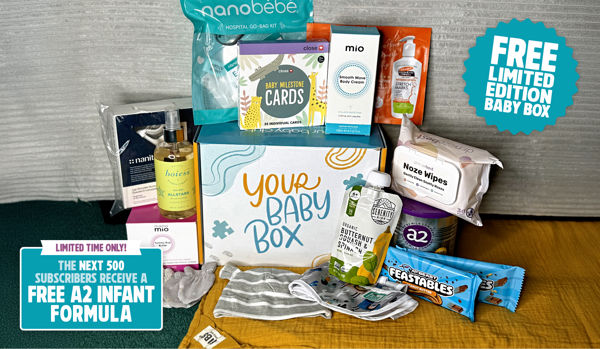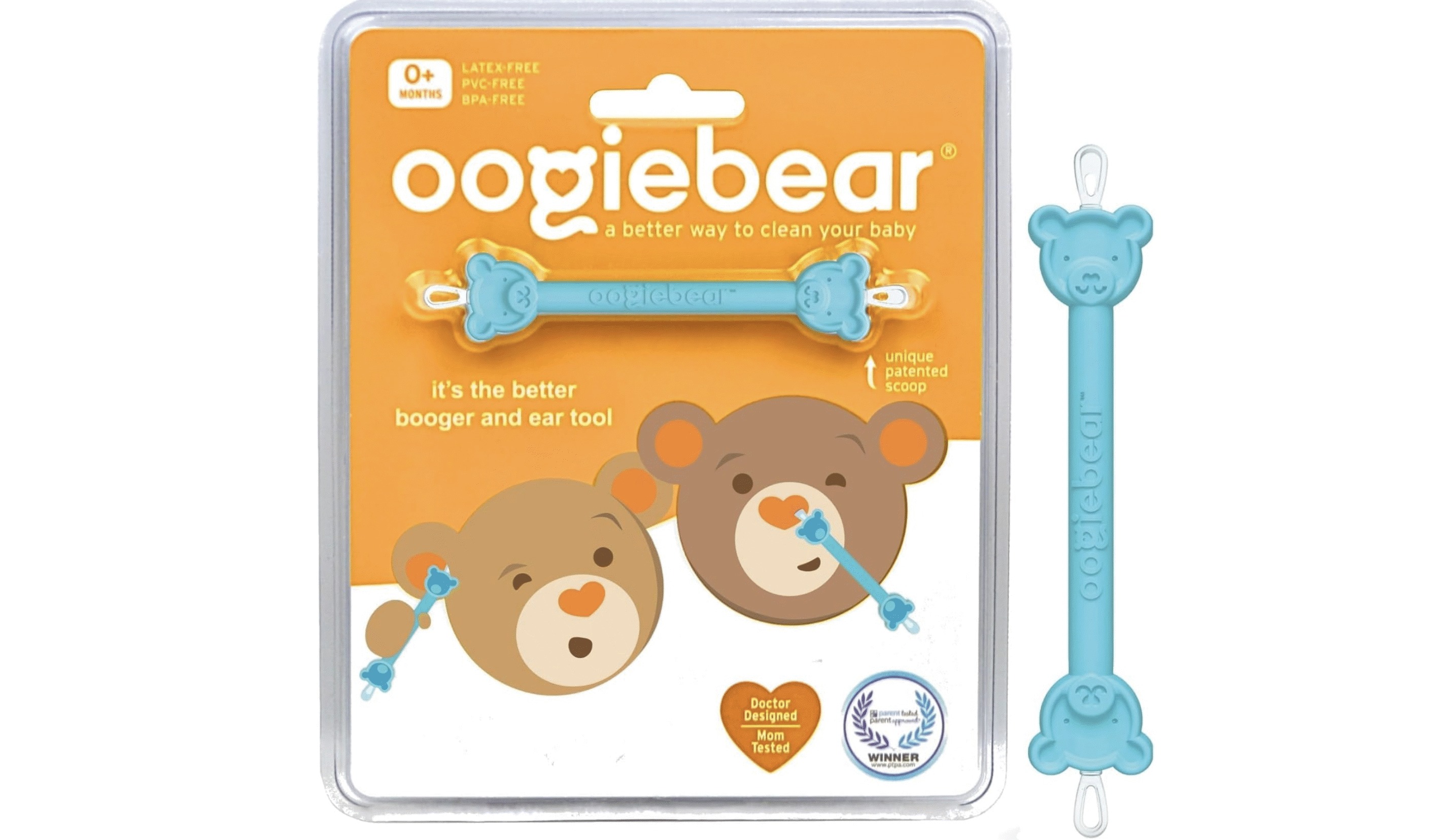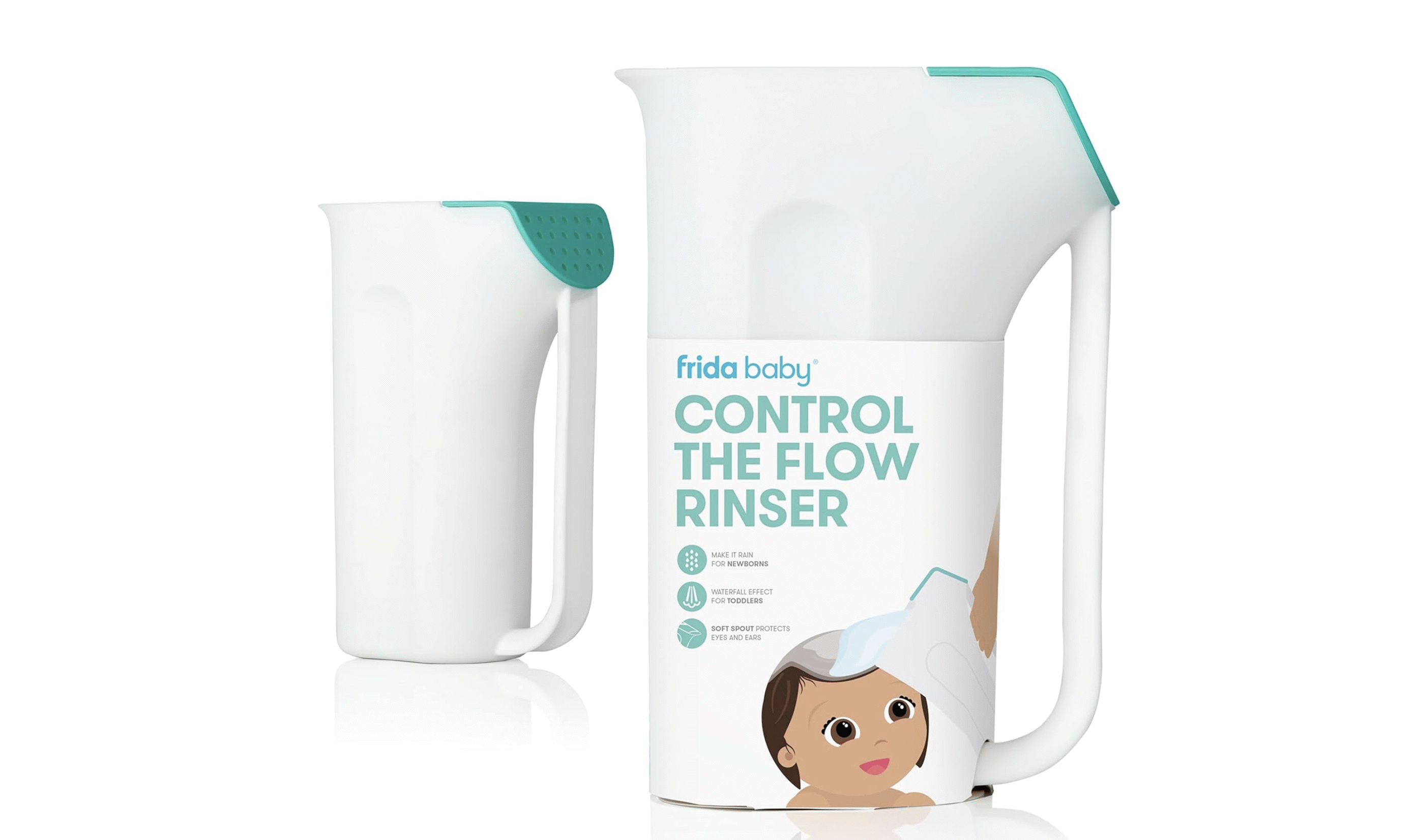Newborn Life

Get started on your parenting journey with feeding essentials, changing must-haves and other handpicked goodies from leading baby brands, worth over $90! Now you can upgrade to a Boy or Girl box!

Get started on your parenting journey with feeding essentials, changing must-haves and other handpicked goodies from leading baby brands, worth over $90! Now you can upgrade to a Boy or Girl box!
Feeding and nutrition are key elements in making sure your baby thrives during their early stages of life! Establishing a feeding routine will help you supply your newborn with the nutrients they need for proper growth and development. Whether breastfeeding or formula feeding, you should focus on ensuring your baby is getting enough food, gaining weight, and meeting nutritional needs. It's also important to address any feeding challenges, such as latching issues or bottle preferences, and to keep track of feeding schedules and any changes in the baby's appetite or digestive patterns. Learn more about infant feeding and nutrition so you can give your baby what they need!
Deciding between breastfeeding and formula feeding, or a combination of both, is a personal choice that depends on a lot of factors, including health considerations for mom and baby, lifestyle, and personal preferences. Breastfeeding has many benefits, such as providing essential nutrients and antibodies that help protect your baby from infections. It can be more cost-effective than formula feeding and is an incredible way to create bonding between mom and baby. However, breastfeeding may present challenges, such as difficulty with latching or concerns about milk supply, and may not always be feasible for every mother due to health issues or personal circumstances.
On the other hand, formula feeding offers flexibility and convenience, allowing other caregivers to participate in feeding and enabling mothers to return to work or manage their schedules more easily. Formula is designed to meet all of a baby's nutritional needs and can be a good option if breastfeeding is not possible or preferred. Ultimately, the decision should be guided by what works best for you and your baby. Consulting with healthcare providers can help you weigh the pros and cons of each option and make an informed choice that supports both your health and your baby's well-being. Whichever choice you make, you're well on your way to meeting your baby's nutritional needs!
Getting started with breastfeeding can be both exciting and challenging. One of the first steps is to ensure that you're in a comfortable and relaxed environment. Setting up a cozy spot with supportive pillows and a good chair can make a big difference. It's helpful to learn about proper latch techniques and positions to make breastfeeding more comfortable for both you and your baby. A good latch ensures that the baby is feeding efficiently and helps prevent common issues like sore nipples.
In the early days, it's normal for breastfeeding to feel a bit overwhelming as you and your baby adjust. Frequent feedings, often every 2-3 hours, are typical as your baby's stomach is tiny and they need to eat often to get the nutrients they need. It's also a time for you to establish your milk supply and for your baby to develop their feeding skills. Don't hesitate to seek support from a lactation consultant or breastfeeding group if you encounter difficulties or have questions. Remember, breastfeeding is a learning process for both you and your baby, and with patience and practice, it will become more intuitive over time!
Getting started with formula feeding is a practical and manageable option that comes with its own challenges and rewards. The first step is choosing a formula that meets your baby's nutritional needs. There are various types available, including cow's milk-based, soy-based, and hypoallergenic formulas, so it's a good idea to discuss your options with your pediatrician to select the best one for your baby's health and dietary requirements. Once you have the formula, you'll need to follow the preparation instructions carefully to ensure it's mixed correctly and safely. This typically involves using clean bottles and nipples, measuring the water and formula powder accurately, and mixing them thoroughly.
Establishing a feeding routine is another key aspect of formula feeding. Newborns usually need to be fed every 2-4 hours, and as they grow, their feeding patterns will change. It's important to pay attention to your baby's hunger cues and be flexible with feeding times. While formula feeding doesn't require the same level of on-demand feeding as breastfeeding, maintaining a consistent feeding schedule can help regulate your baby's digestion and sleep patterns. Keeping track of feeding times, amounts, and any reactions to the formula can be helpful for monitoring your baby's growth and well-being.
It's essential to feed your newborn the correct amount and at appropriate intervals. Newborns typically have small stomachs and high metabolic needs, so they require frequent feedings, usually every 2-3 hours, including during the night. This means that newborns may need to be fed 8-12 times in a 24-hour period. As they grow, their stomach capacity increases, and they can go longer between feedings, gradually moving towards a more predictable feeding schedule.
The amount of milk a newborn needs varies depending on their age, weight, and individual appetite. In the first few days, newborns consume small amounts, often around 1-2 ounces per feeding. By the end of the first week, this amount typically increases to about 2-3 ounces per feeding. As they grow, the quantity per feeding will increase, and the frequency may decrease as they can consume more milk at each feeding. Monitoring your baby's growth and weight gain during pediatrician visits will help ensure they are getting enough nutrition. It's also important to pay attention to hunger cues and ensure the baby is feeding effectively, whether breastfeeding or bottle-feeding, to support their health and development.
Monitoring growth and development in newborns helps confirm that they are thriving and meeting their milestones. Regular check-ups with a pediatrician are key to tracking your baby's growth, including measurements of weight, length, and head circumference. These metrics help assess whether your baby is growing at a healthy rate and can provide early indications of any potential health issues. Pediatricians often use growth charts to compare your baby’s measurements with standardized growth patterns for their age and sex, which can help identify any deviations from typical growth trends.
In addition to physical growth, monitoring developmental milestones is important. Newborns undergo rapid changes in their sensory, motor, and cognitive skills. During the first few months, you’ll observe significant milestones such as improved head control, the ability to focus on faces, and the development of feeding skills. Regularly engaging with your baby through activities like tummy time, talking, and playing helps support these developmental stages. If you have concerns about your baby’s growth or developmental progress, discussing them with your pediatrician can provide reassurance and guidance. Early identification and intervention can help if any developmental delays or issues are noted.
Managing newborn feeding challenges can be a critical aspect of ensuring both you and your baby have a positive feeding experience. One common challenge is difficulty with latching during breastfeeding, which can lead to issues like sore nipples and inadequate milk intake. To address this, it’s important to seek guidance from a lactation consultant who can demonstrate proper latch techniques and suggest comfortable feeding positions. Sometimes, using nipple shields or adjusting the baby's position may help improve these issues.
Another challenge may be related to milk supply, whether too much or too little. If you’re breastfeeding and concerned about low milk supply, ensure you’re feeding frequently and effectively, and consider expressing milk to stimulate production. For formula-feeding parents, managing the right amount and type of formula can be challenging, especially if the baby has specific dietary needs or sensitivities. Monitoring your baby’s reaction to different formulas and consulting with a pediatrician can help you find the best option.
Feeding challenges can also include clogged milk ducts, mastitis, and managing reflux or colic, which can cause discomfort during and after feedings. For reflux, feeding smaller amounts more frequently and keeping the baby upright after feeds may help reduce symptoms. Colic can be particularly stressful, but maintaining a soothing feeding environment and experimenting with different feeding techniques or types of bottles may provide relief. Overall, patience and seeking professional advice when needed are key to overcoming these challenges. You may hit a few bumps in the road, but implementing these suggestions can make feeding time with your baby something you both look forward to!
The topic of sleep can fill expecting parents with dread - but there are many ways to promote a restful environment for your newborn that will make it easy (relatively!) for them to get enough sleep.
Establishing a healthy sleep routine for a newborn is one of the most pivotal aspects of early parenting, impacting both the baby's development and the family's overall well-being. In the first few months, newborns experience rapid growth and changes, and their sleep patterns can be unpredictable and frequent. Understanding the fundamentals of newborn sleep, including the amount of sleep they need and how to create a soothing environment, will enable you to create healthy sleep habits for your little one!
One of the most important things parents can do to keep their newborns safe and healthy is to ensure they sleep in a safe environment that follows safe sleep guidelines. One fear at the forefront of most parents' minds is the risk of Sudden Infant Death Syndrome (SIDS). SIDS is a baby's sudden and unexplained death within the first year of life. To prevent this, the American Academy of Pediatrics (AAP) recommends the following safe sleep guidelines for newborns:
The safest position for your baby to sleep in is on their back. This position helps to reduce the risk of SIDS by keeping your baby's airway clear and reducing the likelihood of overheating. It is essential to place your baby on their back every time they sleep, including for naps. If you’re struggling with getting your newborn to sleep comfortably, check out Sleep Struggles: Does Your Newborn Refuse to Sleep on Their Back? to learn why some newborns may resist back sleeping and what you can do to help.
It is important to place your baby on a firm and flat sleep surface, such as a crib or bassinet. Soft surfaces such as adult beds, couches, or chairs can increase the risk of suffocation, strangulation, and entrapment.
The AAP recommends that parents share a room with their newborn for at least the first six months of life, ideally for the first year. This practice can help reduce the risk of SIDS by providing close proximity to the baby and making it easier to monitor their breathing.
Soft bedding, such as blankets, pillows, and stuffed animals, can pose a risk to your baby's safety by increasing the risk of suffocation, entrapment, and strangulation. Instead, dress your baby in a sleep sack or wearable blanket to keep them warm and comfortable.
Overheating can also increase the risk of SIDS. Make sure your baby's sleep environment is kept at a comfortable temperature, ideally between 68 to 72 degrees Fahrenheit, and avoid using too many layers or heavy blankets. Dress your baby in light layers and use a lightweight, breathable blanket if necessary.
Exposure to smoke, whether in utero or in the environment, can increase the risk of SIDS. Keeping your baby away from cigarette smoke and avoiding smoking yourself is vital.
It is also essential to follow safe sleep practices when traveling or when your baby is in someone else's care. Make sure your baby's sleep environment is safe and follows the above guidelines no matter where you are!
Newborn sleeping patterns can be quite different from those of older infants and adults, as their sleep cycles are shorter and more frequent. In the early weeks of life, it’s typical for newborns to sleep between 14 to 17 hours a day, although this sleep is often broken up into multiple short periods. Newborns typically have sleep cycles lasting about 50-60 minutes, which include both light and deep sleep stages.
Due to their small stomachs and rapid growth, newborns often need to eat every 2-4 hours, which can disrupt their sleep patterns. During these early months, you can expect irregular sleep schedules and you may experience frequent nighttime awakenings. This can be a tough period for parents, but hang in there–this pattern gradually matures as your little one grows, with longer stretches of sleep developing as they approach 3 to 6 months of age.
Establishing a consistent sleep routine and creating a conducive sleep environment can help newborns gradually adjust to a more predictable pattern, and prevent sleepless nights for you. This includes maintaining a regular sleep schedule, creating a soothing bedtime routine, and ensuring a safe sleep space. While newborns' sleep patterns can be challenging to manage, understanding their typical behavior and gradually implementing sleep strategies can help both parents and babies adapt to a more restful and predictable sleep routine over time. Those long nights will all be worth it in the long run!
Establishing a sleep routine for your newborn can provide structure and consistency, helping both you and your baby navigate the early months more smoothly. Start by creating a calming bedtime routine that signals to your baby that it’s time to wind down. This routine might include activities such as a warm bath, gentle massage, reading a short book, or singing a lullaby. Keeping the routine consistent every night helps set expectations and prepares your baby for sleep–and is a great way to bond with your baby!
Next, focus on creating an ideal sleep environment. Ensure the baby's sleep area is quiet, dark, and at a comfortable temperature, ideally between 68 to 72 degrees Fahrenheit (20 to 22 degrees Celsius). Use a firm mattress with no loose bedding or soft objects to reduce the risk of sudden infant death syndrome (SIDS). A white noise machine can help mask household sounds and create a soothing background noise, while blackout curtains can help maintain a dark and calm environment.
Establishing a sleep routine also involves setting a consistent sleep schedule. Even though newborns have irregular sleep patterns, try to put them to sleep at the same time each night and during daytime naps. This helps regulate their internal clock and encourages more predictable sleep patterns over time. During the day, allow your baby to sleep in a well-lit environment to differentiate between day and night, which can help with establishing a clear day-night sleep pattern. While flexibility is important, especially in the early weeks, maintaining a routine can gradually help your baby develop more consistent sleep habits as they grow. Good luck and happy sleeping!
Babies often face a range of sleep-related issues during their early months–but with the right tools and information, managing these sleep challenges is possible! Common challenges include frequent night awakenings, difficulty falling asleep, and irregular sleep patterns. Newborns typically wake every 2-4 hours for feedings, which can disrupt their sleep and yours. Additionally, their sleep cycles are shorter and more fragmented, leading to periods of light sleep that may cause them to wake more easily.
One effective strategy for managing these challenges is establishing a consistent bedtime routine. A calming routine, such as a warm bath followed by gentle rocking or a lullaby, helps signal to your baby that it's time to sleep. Maintaining a regular sleep environment is also crucial; ensure the room is at a comfortable temperature, quiet, and dark. Using white noise machines can help mask household sounds and create a soothing backdrop for sleep.
Another challenge is dealing with sleep associations, such as needing to be rocked or fed to fall asleep. Gradually transitioning your baby to fall asleep independently can help them learn to self-soothe. This might involve slowly reducing the time spent rocking or feeding before bedtime and allowing them to fall asleep in their crib. Be patient and consistent with these methods, as it can take time for babies to adjust to new sleep patterns. If sleep issues persist or become overwhelming, consulting with a pediatrician or a sleep consultant can provide additional guidance and support tailored to your baby's needs. Remember, it’s important for parents to get enough sleep to properly care for their little one–so don’t hesitate to reach out for help if you need it!
Now that your baby has arrived, your most important task is to keep them happy and healthy! Monitoring your baby's health during the newborn phase will involve regular pediatric check-ups, vaccinations, and watching for any signs of illness or developmental concerns. You should keep track of your baby's habits and be aware of common newborn issues such as jaundice, colic, and umbilical cord care.
We've compiled all the information you need to cover the basics of newborn care! Just remember, if you're uncertain about anything you can always reach out to your healthcare provider.
Routine pediatric check-ups are an essential part of ensuring your baby’s health and development during their first year of life. These visits allow your pediatrician to monitor key growth markers, such as your baby’s weight, height, and head circumference, while also tracking milestones in their physical and cognitive development. Regular check-ups also provide an opportunity to discuss feeding, sleep, and general care, helping you feel confident in managing your newborn’s daily routine. If your baby is born at home or in a birth center, a midwife may provide care for the first few weeks, but it’s recommended that newborns see a doctor within their first week of life.
After the initial visit, your baby will continue to have check-ups at specific intervals: typically at one month, two months, four months, six months, and nine months. These early visits are crucial for staying on top of vaccinations, which protect your baby from serious diseases. These initial shots protect against serious illnesses like rotavirus, diphtheria, tetanus, whooping cough, polio, and meningitis.
During each appointment, a nurse will begin by taking your baby’s vitals and measurements. You’ll also have the opportunity to share any observations you’ve made at home, such as how often your baby is eating, any difficulties with feeding, how much they’re sleeping, and their diaper habits. Being mindful of these details will help you and your pediatrician catch potential concerns early and ensure your baby is thriving.
While regular medical care is vital, always trust your instincts as a parent. You know your baby best, and if you ever feel unsure about something, don’t hesitate to contact your healthcare provider. Whether it’s a small question or a bigger concern, seeking advice early on will help you feel more at ease and confident in caring for your newborn.
Monitoring your baby's growth and development is one of the most important aspects of early parenting. From tracking physical changes like weight, length, and head circumference to observing developmental milestones such as motor skills and social interactions, these indicators help you ensure your baby is growing as expected. Your pediatrician will provide growth charts and regular assessments to guide you in understanding your baby's progress. While every baby develops at their own pace, these benchmarks help identify areas where your little one may need extra support.
In the early weeks, your baby will rapidly gain weight, averaging about 25 grams a day. They'll also begin to recognize familiar voices and smells and might even mimic your facial expressions. At one week old, their vision will allow them to see roughly 25 cm in front of them, and they'll develop reflexes like gripping your finger or rooting for food. By four weeks, they may find their own hands and feet, respond to loud noises, and start lifting their head during tummy time. Encouraging these early skills through interaction and support is crucial to your baby's development.
Milestones like these are divided into social, communication, cognitive, and physical development categories. Keep in mind that these milestones are just guides - every baby reaches them at their own pace, and it's perfectly normal for some to develop faster in certain areas than others. Growth and development can vary widely from baby to baby, so try not to worry if your little one takes a bit longer to master certain skills. Trust your instincts and talk to your pediatrician if you have concerns.
Proper care of your baby’s umbilical cord stump and sensitive skin is key to ensuring their health and well-being. After birth, the umbilical stump essentially becomes a scab that protects the healing skin underneath. It will naturally dry up and fall off within two to three weeks, but it’s important to keep the area clean and dry in the meantime. Avoid submerging your baby’s abdomen in water until the stump falls off–opt for sponge baths instead. Be sure to check for any signs of infection, and resist the urge to pull the stump off, even as it starts to loosen.
For cord care, using cotton wool and water to gently clean around the stump is ideal. Fold your baby’s diaper down to prevent it from rubbing or irritating the area. If you notice any redness, swelling, or oozing, reach out to your healthcare provider. Once the stump falls off and the area has fully healed, you can begin giving your baby regular baths. Just remember to keep their first baths simple, using only warm water and mild, hypoallergenic products to protect their delicate skin.
When it comes to overall skincare, it’s important to choose gentle, fragrance-free products designed for babies. Your baby’s skin is more prone to dryness and irritation, so moisturizing with emollient products can help lock in moisture and prevent conditions like eczema. Avoid using too many bath products, as these can dry out your baby’s skin. If diaper rash occurs, allow your baby some diaper-free time to let air circulate and help the skin heal, and consider using diaper creams and baby powder.
Finally, be mindful of sun exposure, as babies under six months should not be exposed to direct sunlight. Use high-SPF sunscreen formulated for sensitive skin, dress your baby in light, loose clothing, and always opt for shade when spending time outdoors. Protecting your baby’s skin from harsh elements will ensure it remains soft and healthy as they grow.
Managing common newborn conditions like jaundice, colic, and reflux can be challenging, but understanding the signs and knowing how to address them will help keep your baby comfortable and healthy. Jaundice is a common condition that causes a baby's skin and eyes to appear yellow due to high bilirubin levels. This usually resolves on its own as your baby's liver matures, but make sure to consult your healthcare provider to be safe.
Colic - another common issue, typically involves prolonged periods of intense crying, often in the late afternoon or evening. You may notice your baby clenching their fists, arching their back, or pulling their knees up to their tummy while crying. These are signs of discomfort, and while colic is generally harmless, it can be distressing for both baby and parents. To soothe your baby, try holding or cuddling them, burping them after feeding, or gently rocking them in their crib. If the crying persists or if your baby shows signs of pain, weakened feeding, or has a fever, it's important to seek medical advice to rule out other possible causes.
Reflux is another condition that can cause discomfort in newborns, leading to frequent spitting up after feedings. This occurs when the muscle that keeps food in the stomach is still developing, allowing milk to flow back into the esophagus. To help manage reflux, try feeding your baby smaller amounts more frequently, keeping them upright during and after feedings, and ensuring they are properly burped. If your baby seems to be in pain, is vomiting forcefully, or is not gaining weight, contact your pediatrician for further evaluation.
Recognizing the symptoms of these common conditions and addressing them early on can help ease your baby's discomfort. Always trust your instincts and consult your healthcare provider if you have any concerns, as timely medical advice can ensure your baby's well-being.
Maintaining good hygiene and practicing infection prevention is crucial for keeping your newborn healthy. Simple habits like regular hand washing before handling your baby and sanitizing feeding equipment can go a long way in reducing the risk of infections. Additionally, keeping your baby’s environment clean by regularly washing bedding, clothes, and toys helps minimize exposure to germs.
It’s also important to be mindful of how visitors interact with your baby. Encourage anyone who visits to wash their hands before holding your newborn and avoid close contact if they have any symptoms of illness. Setting boundaries, such as asking visitors not to kiss your baby on the face or touch their hands, can help protect against serious infections, especially in the first few months when a newborn's immune system is still developing.
If your baby does get sick, there are steps you can take to help them feel more comfortable while their body fights off the infection. Using a cool mist humidifier or spending time in a steamy bathroom can ease congestion, while a nasal aspirator can help gently clear mucus from their nose. It’s also a good idea to have a rectal thermometer on hand to monitor your baby’s temperature, as this method provides the most accurate readings for newborns.
Always consult your pediatrician if your baby shows signs of illness, such as a fever or difficulty breathing. For babies over two months old, infant Tylenol may be used to reduce fever, but be sure to avoid giving them Motrin until they are over six months. Staying vigilant about hygiene and acting quickly when symptoms appear will help keep your baby safe and healthy.
The early weeks following birth are a critical time for parents to bond with their newborn. Bonding can build a deeper emotional connection that increases both physical and emotional well-being for both baby and parent. One way to do this is through responsive parenting, such as holding, talking to, and soothing your baby. Responsive parenting fosters emotional connections and increases security.
During those early weeks, while babies adjust to life outside of the womb, parents also adjust to life as new (or new-again) parents. This includes adjusting to the demands of a new baby which can be emotionally and physically challenging for first-time parents and veteran parents alike. Support for parental mental health through this critical transition is vital for both baby and parental well-being.
Establishing a strong bond with your newborn is crucial for their emotional development and your own emotional well-being. Bonding with your newborn may be harder than you think, but there are steps you can take to make the process easier. Some practices that can be beneficial in the bonding experience include skin-to-skin contact, eye contact, and responsive caregiving. Other ideas for connection are listening to your baby's heartbeat, enjoying that "new baby" scent, and taking time to reflect on each day and its many precious moments. These methods help foster a secure attachment and solidify the parent-child bond that will grow for years to come.
If you choose to breastfeed, a strong bond can help support that process, and in turn breastfeeding and support the bonding process. In addition to feeding and soothing your baby, breastfeeding works to reinforce your connection with one another through purposeful contact. Parents who choose to formula-feed can benefit from feeding time as well as it provides an opportunity to bond and grow the parent-child connection. You can still maintain physical contact while bottle-feeding, and additional caregivers such as partners and grandparents may be able to participate in the process.
So much of the early days of parenting are based on survival and setting the building blocks for long-term relationships as you fill the precious role of caregiver and nurturer for your baby. Beginning with the end in mind, guiding your child into a healthy, happy adulthood, can give you a purpose and motivation when the days may otherwise seem an endless cycle of eating, sleeping, and pooping. Even if your baby can't express it now, they are a full human being with a range of emotions, thoughts, and potential just waiting to be shared with you.
The transition to motherhood can bring a range of emotions, from joy to anxiety or even sadness. The postpartum recovery may be different than expected and bring unanticipated challenges such as breastfeeding struggles, relationship difficulties, and sleep deprivation. However, addressing common emotional struggles such as postpartum depression and anxiety, as well as recognizing the signs and symptoms, can help ensure that new mothers receive the support they need amidst these trials. Open and honest conversations with healthcare providers, support groups, and loved ones are vital for managing emotional health.
Some strong emotions, in particular sadness, can be common after birth and are often referred to as "baby blues". However, if your sadness does not end after a few weeks, becomes significant enough to interfere with your caring for yourself or your baby, or includes other strong emotions such as anger, you may be suffering from postpartum depression (PPD), postpartum anxiety (PPA), or even a more serious condition called postpartum psychosis. These are serious conditions that should be addressed and treated to ensure the health and safety of you and your baby.
Tools that can be utilized in maintaining your mental and emotional health post-birth include caring for your physical health in ways like protecting sleep, maintaining a healthy diet, and engaging in purposeful movement or exercise. Additionally, you may wish to utilize skills such as meditation or journaling in addition to participating in hobbies or activities that bring you joy. Some new parents may benefit from talk therapy, or prescription medication to address their individual needs under the direction of a licensed medical professional. Know that you know yourself better than anyone else, and you need to communicate if something doesn't feel right and advocate for the care you need.
Building a support network is important for a healthy and sustainable emotional adjustment post-birth. Discussing expected roles and responsibilities with partners and family members can help this transition go as smoothly as possible. Honestly expressing the need for physical and emotional support with friends and loved ones can also alleviate the pressure of new parenthood.
Seeking out parenting groups in person or finding online parenting communities can be another way to find valuable support through the sharing of advice and common experiences. If you do not already have friends who are in a similar stage in their parenting journey, it can be helpful to find and nurture those friendships as a part of your wide network. Some places you may go to find friends in a similar life stage might be the library, the park, church, or even community events such as parades or festivals. Parents in different life stages can be equally as valuable as they can offer additional insight and support from another perspective you would not have access to otherwise.
While you are focusing on growing your family it can be an interesting dynamic with your or your partner's family of origin. If you have a positive relationship with extended family, now is a good time to strengthen those connections and lean on one another for support. Celebrating the birth of a new baby is a great way to spend time with family and share memories. If you are not close with extended family, or have a tense relationship, take time to establish and/or clarify boundaries to ensure you are protecting your mental health.
Prioritizing self-care is essential for both physical and emotional health. Managing stress, finding time to rest, and taking opportunities to do things you love are all important ways to maintain a sense of personal identity amidst the demands of new parenthood. New parents may need to intentionally set time aside to take breaks and engage in activities that they enjoy to help balance the responsibilities of caregiving with those of personal well-being.
With so many responsibilities, including all the new ones that come with parenthood, it can be difficult to find the time and energy to prioritize time for yourself. If some tasks cannot be neglected while you adjust, you may consider outsourcing to free up time for yourself. Some tasks that can be outsourced include housecleaning, meal prep, yard work, and even pet care such as dog walking. If paying for services is not in the budget you may be able to enlist friends, family, or even community members with appropriate skills and the desire to serve.
You'll also want to reconsider the importance of things such as sleep, healthy nutrition, and exercise. Even if you prioritize these during pregnancy for the sake of your baby, it is just as important to continue prioritizing them now after birth. If you have difficulty justifying the importance for your own benefit, consider that a healthy, happy, parent is the best gift you can give your child. Pay attention to how you are feeling and whether or not you have taken the time to tend to any necessary self-care items. Even basic hygiene can quickly become neglected with the chaos and joy of a new baby distracting you. It's worth it to make the effort to take care of yourself though, the time you spend away from your baby is short compared to the big positive impact it can have on your life.
The arrival of a newborn often requires significant adjustments to daily routines and related expectations. Finding strategies to manage changes in sleep patterns, household responsibilities, and relationship dynamics are all important ways to help ease the transition. It can also be helpful to set realistic expectations and communicate responsibilities and support needs with partners in a clear, loving way.
One of the biggest lifestyle changes introduced with a new baby is a change in sleep routine. Babies are notorious for having their days and nights reversed, not wanting to sleep how and where you want them to, and they also have small stomachs that empty quickly so they will need to wake frequently to feed. It may take some time before you find yourself on a regular sleep schedule, so flexibility and the power of naps are essential in those early weeks. It may be tempting to 'power through' but sleep deprivation can be not only unpleasant but genuinely dangerous so it is important to listen to your body's needs and prioritize sleep however possible.
Another routine that can take some time to get used to is your baby's feeding schedule. If you are breastfeeding on demand you may be surprised to find there doesn't seem to be much rhyme or reason to when your baby eats in the beginning. You may also be struggling with finding a comfortable position, latch issues such as tongue-tie, or supply difficulties; but a lactation consultant can help with any questions you have or difficulties you experience. Formula-fed babies may have a more predictable routine, but it is certainly a routine that can take some getting used to. In addition to actual feeding time, you need to account for bottle preparation before and bottle washing after. While it may seem to take forever in the beginning it will be second nature before you know it.
While the focus is often on the new mother, the emotional adjustment of partners is equally important. Finding ways partners can support one another and address their own feelings of transition can help maintain a healthy relationship and establish a new "normal" during this transitional time. When parents are united and invested in one another it provides a healthy foundation that allows them to show up for each other and their baby in a sustainable way.
Delegating chores, taking turns tending to the baby, and reorganizing your daily routines are all important parts of your new life as a bigger (and better!) family. However, equally important are things such as rediscovering your sex life, maintaining regular intimacy, and getting to know your partner and yourself in your new identities as parents. In addition to the physical aspects of a relationship, you'll want to embrace the new parts of one another that emerge with parenthood. Be generous with your love for one another verbally, as well as through acts of service, or any way your partner appreciates receiving love. Recognize that they are undergoing a life change just like you and be willing to extend the same grace you'd like to receive in return.
Many new parents are unaware that it is possible for dads to struggle with postpartum depression (PPD) as well as moms. While the exact cause may be less physical and more environmental, the effects can be just as real and just as serious. New fathers must be aware of their emotional well-being and communicate any struggles they experience so that they can be addressed. If your partner voices that they are having feelings of sadness, overwhelm, or hopelessness, encourage them to speak with their medical care professional to see if additional support is needed. Likewise, encourage your partner to seek out emotional support through a network of friends, family, and community members so they are not relying solely on you.
The information on the Your Baby Club website is not intended to be a substitute for professional medical advice, diagnosis or treatment. Always discuss any health concerns with a qualified healthcare provider and carefully review all guidance that comes with any medications or supplements before taking.










